|
•
LAND
PURCHASE
|
•
NO BLUEPRINTS NEEDED
|
•
TOUGH TENT LIVING
|
| •
CONSTRUCTION PHOTOS |
•
THE FIRST BAR COMPLETED |
•
DOGSLED ACCIDENT |
|
•
APPENDICITIS
|
•
FLORIDA RECUPERATION
|
•
A NEW ROMANCE
|
|
•
LOVE LETTER TO SUE
|
•
MARRIAGE
|
•
SUE COMES WEST
|
|
•
JOHN CHOPS FINGERS OFF
|
|
|

| In
1946, John Quigley purchased 40 acres of land on
the eastern side of MacDonald Pass from the McIntosh family
of Avon, Montana. This marked the beginning of Frontier
Town, the project which would occupy the remaining 32
years of John's life. |
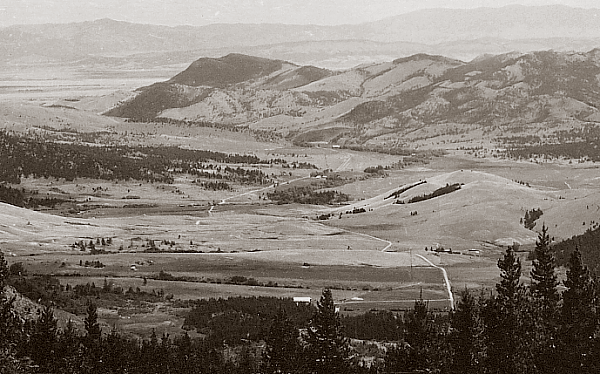
Looking
east toward Helena from the site of Frontier Town, late 1940s.

|
There
were no blueprints for Frontier Town...
|
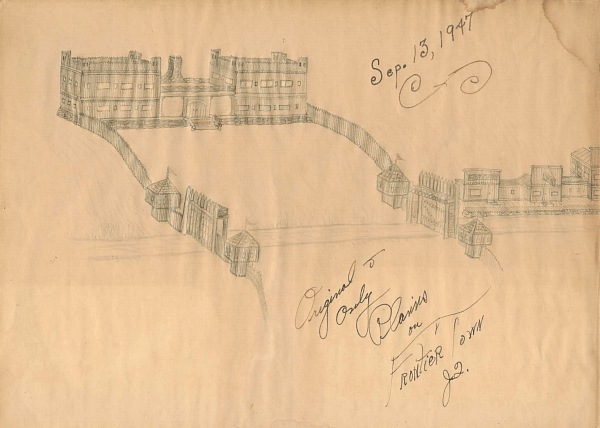
CLICK
ON IMAGE TO OPEN A BIG VERSION IN A NEW WINDOW
"Original
& Only Plans on Frontier Town - J. Q. Sep. 13,
1947"
Pencil
and ink on paper by John Quigley
The large separate lodge was never built, but the
final configuration of Frontier Town was very close
to the rest of the plan.
|
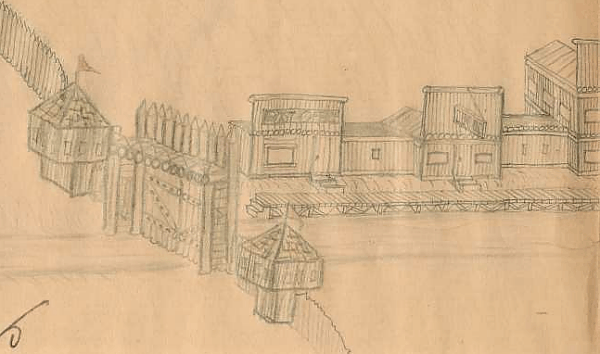
Detail
of Quigley's plan, showing the stockade construction
which became familiar to hundreds of thousands of
visitors over the decades.
|

| In
December of 1947,
Quigley pitched a tent on his new-acquired land, and with
some rudimentary tools, a team of oxen, a few well-worn
machines, and the invaluable help of Slim Wilson and Joe
Alt, two old-timers skilled in stone and log construction,
he began work on Frontier Town. |
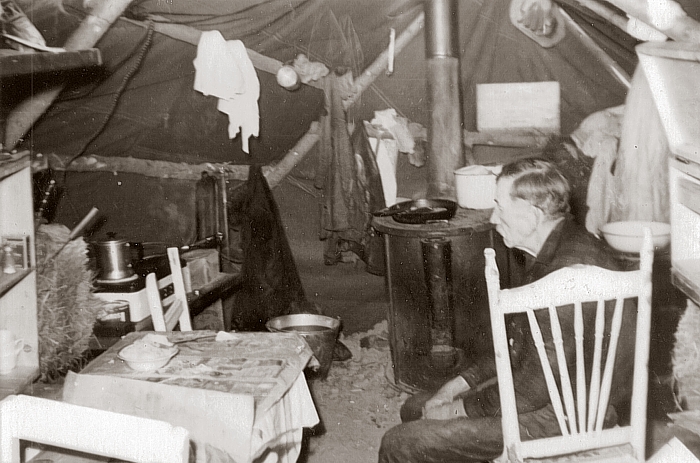
|
A
December 1947 view
inside the tent that John Quigley and his helpers occupied
during the first phase of Frontier Town's construction.
The
trio peeled and skidded logs, but John had to shovel
snow every day before work could start. Temperatures
dipped to 40º below zero. In fact, most of Frontier
Town's construction over the years took place during
the harsh winter months; good weather was meant for
trade, not building.
During
the first winter, they completed construction of the
northwest blockhouse, which housed the bar, and several
of the little pioneer cabins which faced Frontier Town's
Main Street. With the protection of what he had already
built, Quigley stayed indoors during most of the next
two winters, spending the time making tables and chairs.
These consisted of three to six-inch thick polished
log rounds, with log legs attached with wooden pegs.
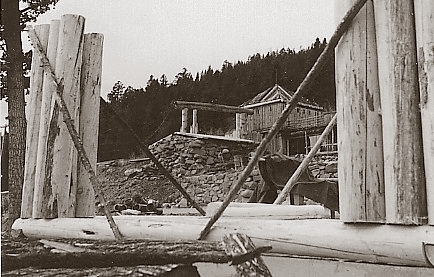
| Early
construction: tourist cabins in the foreground,
the first blockhouse and gate in the distance. |
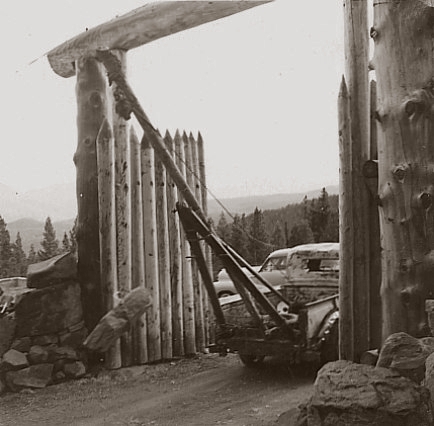
|
Winching
rocks into place near the gate.
|
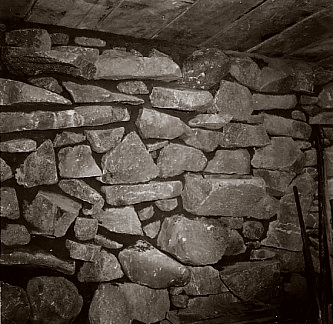
An
example of John Quigley's interior stonework.

John
Quigley hoisting a rock into place, 1960s
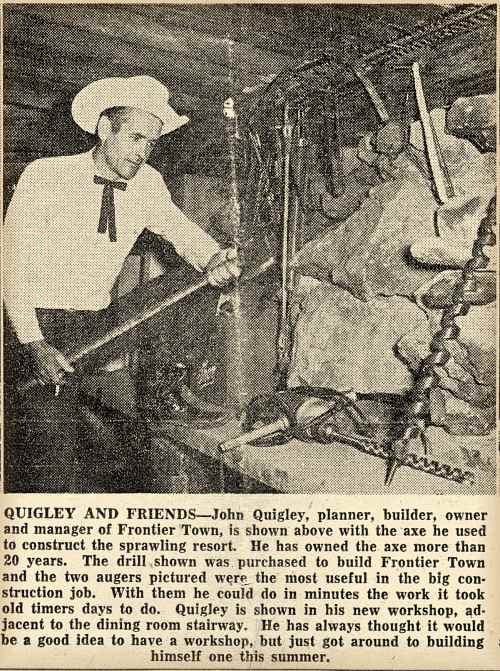
Clipping
from an Independent Record feature on Frontier
Town, Aug. 9, 1953
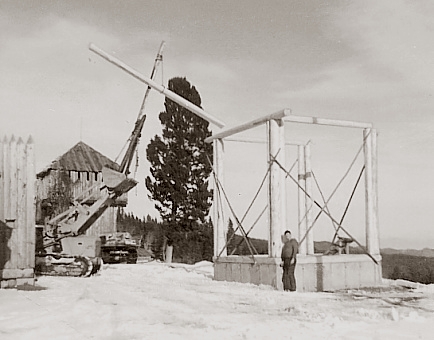
|
Although
these next photos show construction of a later
blockhouse, they illustrate the methods used in
building Frontier Town's log structures...
|
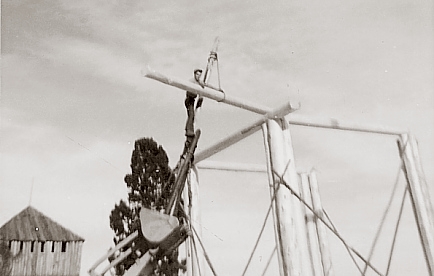
|
Trimmed
and peeled logs were hoisted aloft with the front-end
loader...
|
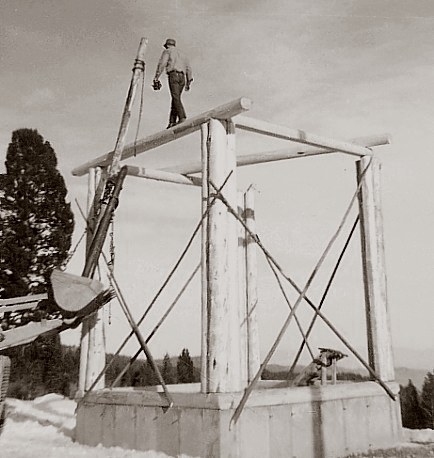
|
...then
muscled into place and secured by man-power, in
this case by John's son Peter Quigley.
|
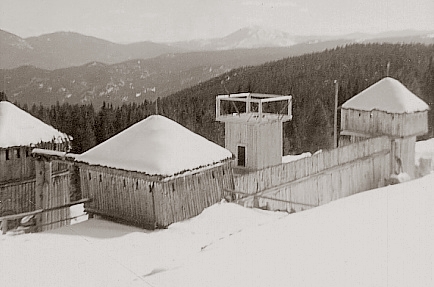
|
Another
later view, showing the top framing of the fourth
and final blockhouse.
|
|

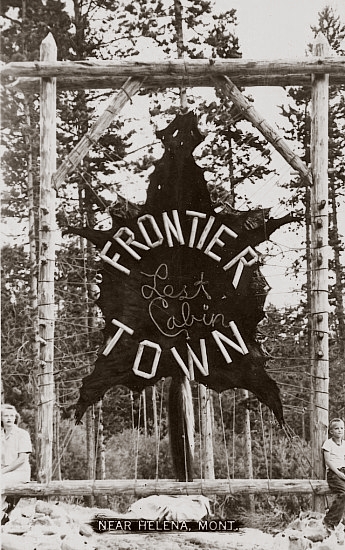
| Probably
the first roadside sign for Frontier Town, about 1949.
During
the first few years, Quigley used the established "Lost
Cabin" name along with "Frontier Town" in
advertisements. |
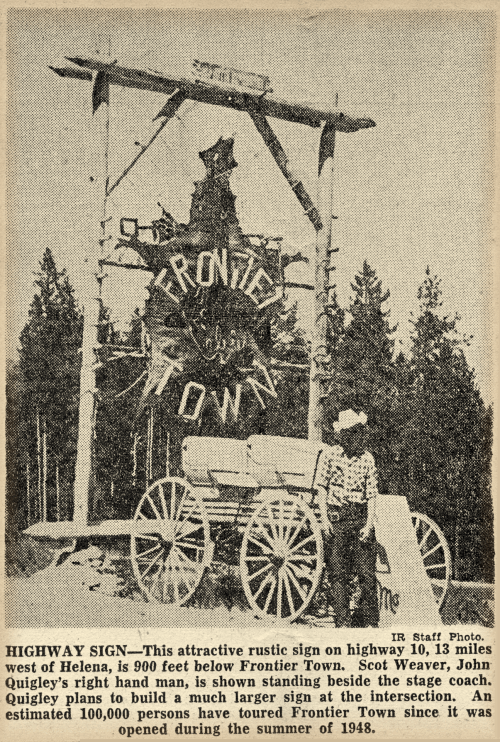
Clipping
from an Independent Record feature on Frontier Town,
Aug. 9, 1953
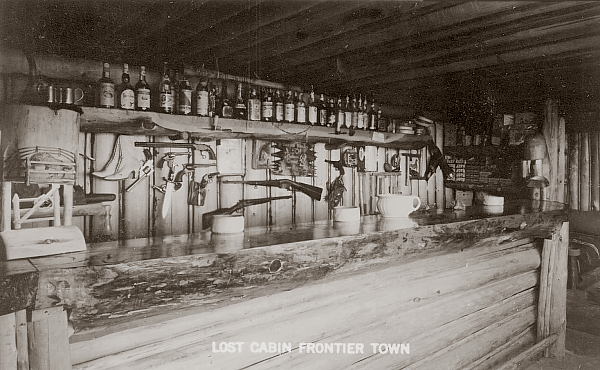
The
first bar, 1948.
 
|
In
those early Frontier Town years,
John Quigley acquired a sled and a team of Alaskan Huskies.
During the winter, he'd take the sled and team out and
look for construction materials. In the spring of 1949,
the team took John over a snow cliff located above Frontier
Town. He suffered multiple fractures to his collar bone,
a dislocated shoulder and separated ribs.
| "I
was in pretty tough shape that spring. Had to tend
bar in a tin vest, but still seemed to be always
getting the bones out of joint. So Slim Wilson used
to pull my arm while I held onto the bar until my
bones cracked back into place. I think it hurt him
more than it did me -- he always turned white."
-- John Quigley |
|
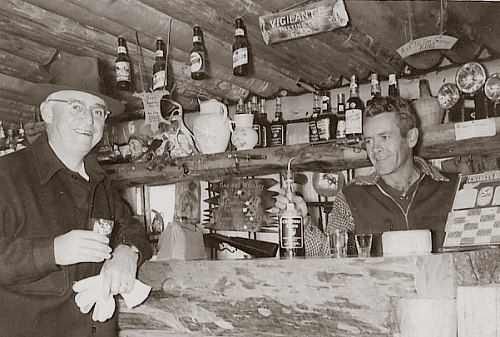
Early
photo of John Quigley tending bar.


FLORIDA
RECUPERATION LEADS TO NEW ROMANCE
|
Quigley
became ill
later in 1949, but put off seeing the doctor. When
he was finally diagnosed, it was discovered that he
had a ruptured appendix and peritonitis, a serious complication.
His doctor effected a cure, but strongly advised John
to take it easier.
John
took his advice, and soon took a kind of "working
vacation" to Florida's eastern shore, where he
found employment at Delray Beach as a lifeguard, bus
boy and bartender.
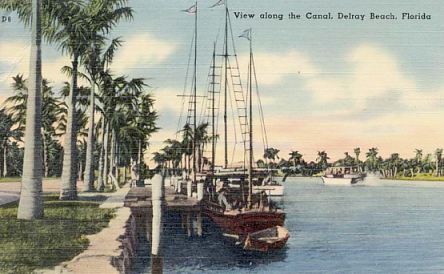
| It
was at Delray Beach that John met Sussan Whittier
of Grand Rapids, Michigan. Their
relationship was intense. John visited Sue and her
parents, Mr. & Mrs. Olin Whittier, in Grand
Rapids before returning to Montana for the winter.
|
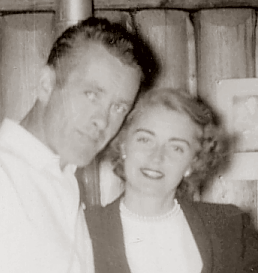
JOHN
AND SUE, 1950
|


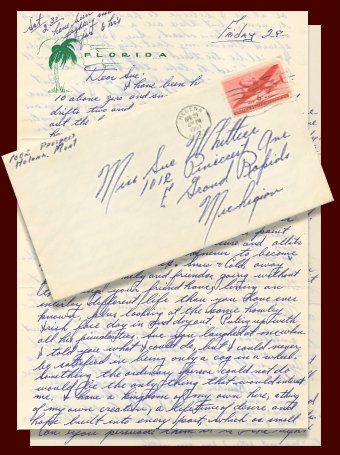
| On
April 29, 1950, John Quigley dug his car out of a Frontier
Town snowbank, and drove down MacDonald Pass to Helena.
There, he mailed this airmail letter (on Florida stationery)
to Miss Sussan Whittier at her home in Grand Rapids. In
it, John explained to Sue what a tough life it might be
for her if she married him and moved to Montana. The following
transcription of the letter includes John's spelling and
punctuation idiosyncrasies. |
|
Friday
28
Dear Sue,
I
have been here two days now. 10 above zero and snowing
like hell. New drifts two and three feet deep. I have
cleaned out the bar and lounge and live in the lounge.
Have not been able to turn on the water yet as the snow
is up to and over the eaves in the back where I have
to turn the drain off. It is nice and cozy inside, but
oh so lonesome.
I
don't know what you would think of this sort of a life,
it is a far cry from Delray, etc. I guess strictly a
man's unless you were to become an outdoor girl. You
would either love it or hate it and only the former
would keep you happy. Sure I could paint you a purty
picture of the future and all its possibilities, but
what if its never to become any better than it is. Snow
& cold, away from your family and friends, going
without the things your friends have, living an entirely
different life than you have ever known, plus looking
at the same homely Irish face day in and day out. Putting
up with all his peculiarities.
Sue
you laughed at me when I told you what I could do, but
I could never be satisfied in being only a cog in a
wheel. Something the ordinary person could not do would
be the only thing that would interest me. I have a kingdom
of my own here, a thing of my own creation, a lifetime
of desire and hope built into every part, which as small
as it is I believe to have a future second to none,
but there are a lot of hard times and tribulations ahead.
Sue,
I am afraid. Afraid this is my last big try. If it fails
I will be too tired to try again and will be inclined
to take the lines of least resistance. A clerk, a salesman
or etc. But in my heart I would be licked. I have been
fighting from the time I was twelve years old and have
a world of guts and determination left for this, but
I'm afraid not for something new.
How
then can you tell unless you yourself can be here long
enough to see under the gay carefree life it seems to
be. It could become a gilded palace to you if you liked
everything about it as on the other hand a thing of
discust.
The
only thing in the world that stops me from coming back
and marrying you right now is your future happiness.
If you were to become unhappy after a year or two it
would kill me and rather than take a chance I would
die first.
I
hate to ask you to go against your parents advice and
I know how they feel, but how else will we know. I know
doing anything else we would have no questions. But
this project is different, you would just have to love
it. I think you will but we can not take a chance on
that because it would be all your future.
Remember
a long time ago you gave me a look or two of discust
well never again would I like to see that. and I intend
you shall never have the occasion.
I
have thought of writing too your parents but what can
I tell them -- that my intentions are honorable. --
that as wild as I have been and the thousands of girls
I have known their daughter is the one and only -- the
one and only one I want to love for the rest of my life.
-- that I want you to learn and understand my business
to assure you of your future happiness before we marry
which you your self would know by fall. (the last they
may appreciate better than you)
With
the same interests we would have the best corner stone
for an enduring marriage possible. Without it all the
pillars are under a stress and strain, depending on
the props of chance to hold it up.
I
don't know why I didn't try to explain to them when
I was there but I guess I still wanted you to check
over your old boy friends but I realize now that knowing
me as well as you do they are out or of no consequence
as far as we are concerned.
What
can we do about your parents. Can you persuade them
it is the right and senceable thing to do. I suppose
it would be hard for them to see. But how else will
you know. You know nothing about this sort of life except
what your imagination has made up for you.
This
is going to be a tough summer. I am going to get my
as cheap as possible. Not going to run the cafe but
have coffee & sandwiches. Concentrating on the bar.
Spare time developing what I have and planning for next
year. Hopeing to work out something definate on the
dude ranch and wind up the summer with a little money
to build more next year.
It
has been a week since you wrote the last letter I have.
I hope to have more than one when I go into town tomorrow.
The car is drifted in and will have some time getting
to the highway. Blizard conditions have been reported
here for past three days and will continue for a few
more and who knows it to be a fact better than I right
here in the middle of it. Will enclose your $50.00 and
how good it was to have it with the long detours I had.
Your little note in the lunch brought tears to my eyes.
I
love you Sue more than you have ever been loved before,
because anyone without the hard knocks and aprehension
I have would never have let you out of their sight.
All
my love
John
P.S.
The longest letter I have ever written.
|
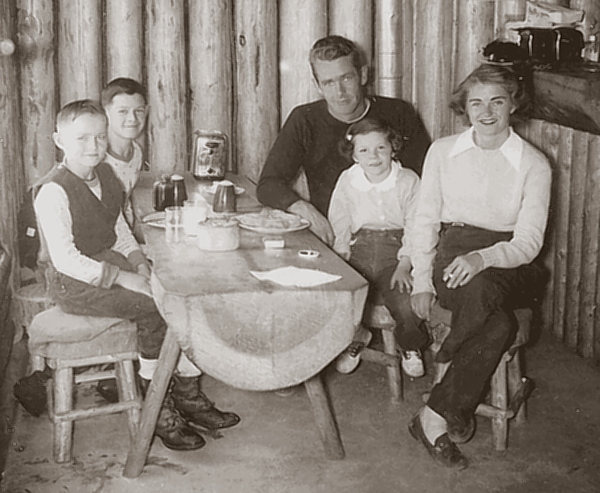
Peter
Quigley, Jack Quigley, John Quigley, Kitty Ann Quigley, Sue
Quigley -- 1950.
|
Sue
accepted John's proposal,
and the couple were married in the Whittier family home
in Grand Rapids on May 6, 1950.
They
took a week to get to Montana, arriving in Helena on
the day of the Vigilante Parade. Following Sue's first
view of the colorful annual event, they headed west
to Frontier Town. Even though the date was May 12, the
road from the highway to Frontier Town was still drifted
over with snow. John went up and hitched his husky Kiska
to the dogsled and returned for his bride. They loaded
Sue and her luggage on the sled, and she made a rather
spectacular arrival at her new home.
|
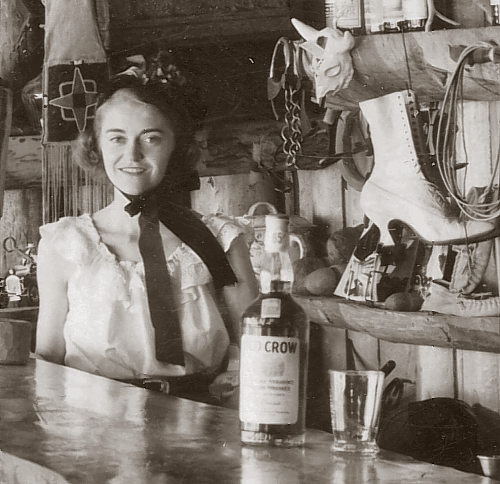
|
Sue
behind the first Frontier Town bar, about 1950.
Sue was a major factor in Frontier Town's success. Her
duties were many, including relief bartender, superintendent
in charge of tourist rooms, hostess, and bookkeeper.
However, her main business contribution was the operation
of the large gift shop, which she built into one of
the best in the West.
"Sue's
shop...it was the best. She was able to sell, and with
that my dad did his thing." - Kitty
Ann Quigley Taaler
|
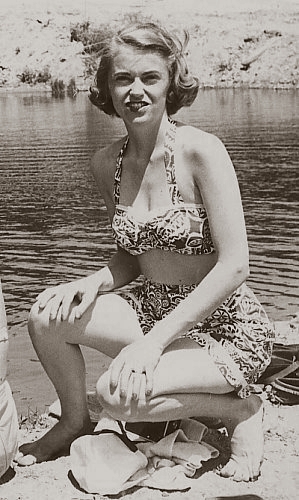
Sue
Quigley by the Frontier Town pond, 1950.


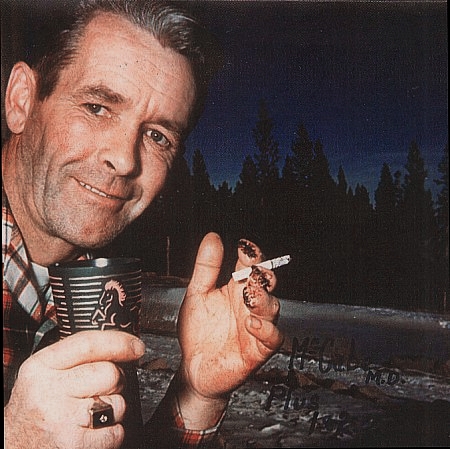
|
Around
1957 , John lost the tips of three fingers on his left
hand to an electric planer.
"It
happened in the Spring. John sent Sue after the fingers.
John had them put in plastic and kept them behind the
bar. People would ask him, 'How did you do all this
work?', and if he was in the mood he would thump his
stumps on the bar and say, 'I worked my fingers to the
bone.' Then he would pull out the fingers in plastic."
- Kitty Ann Quigley Taaler
|

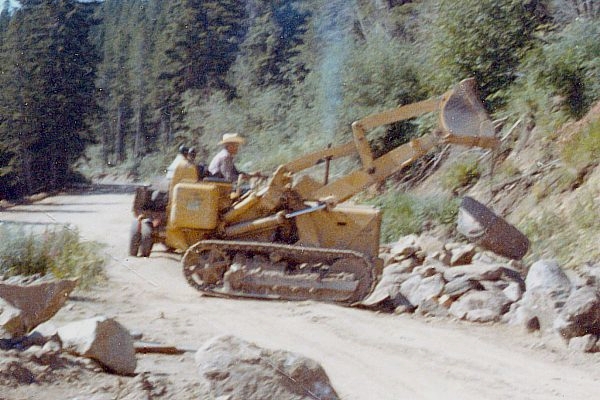
John
Quigley moving boulders, 1956.
|